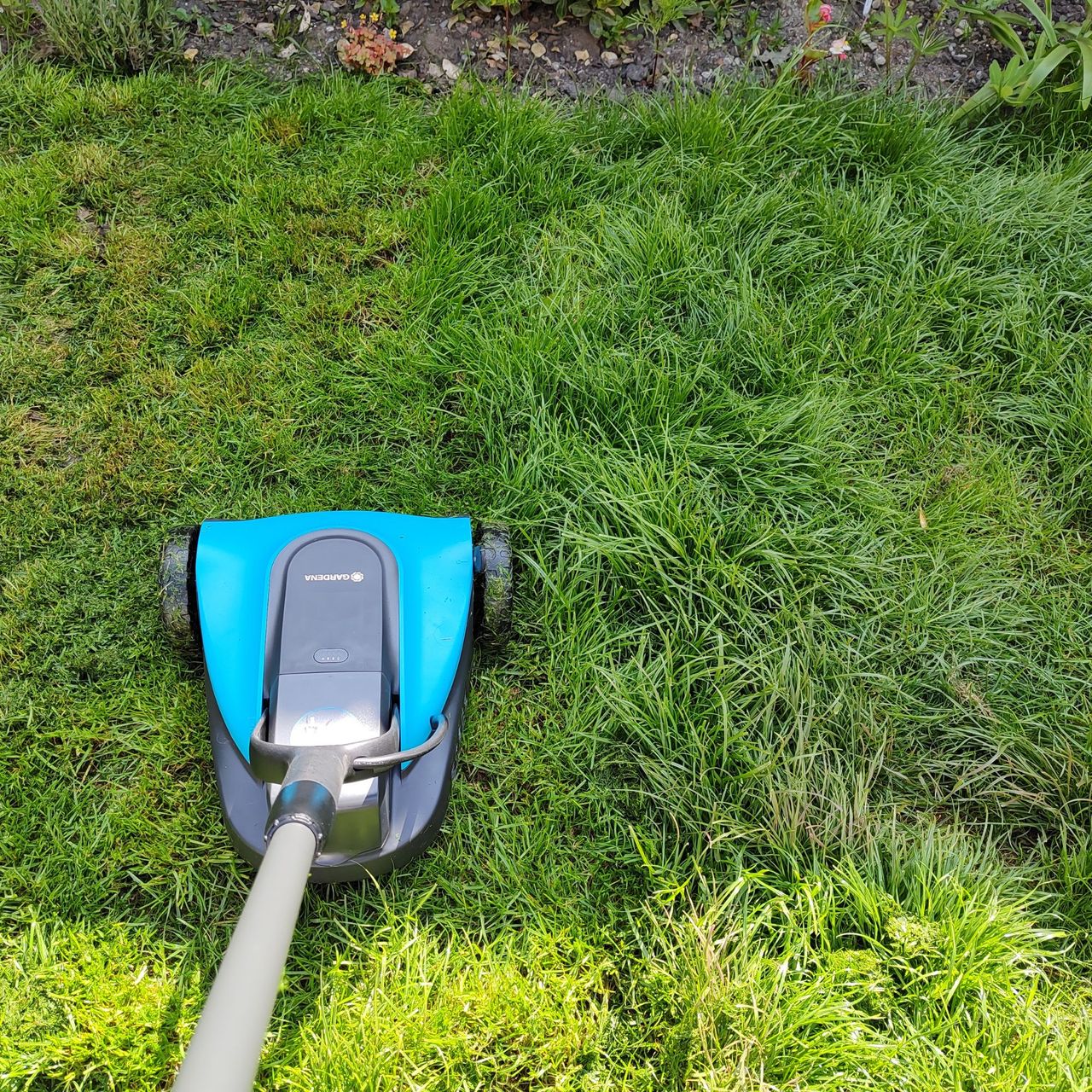
If you're looking for a small lawn mower, you'll want to take a look at the Gardena Handymower – it's a game-changer.
The lightweight battery-powered mower is designed for small to medium-sized lawns measuring up to 50 m², and I think it's one of the best lawn mowers on the market. With limited shed storage space and a small lawn in our city garden home, the Gardena Handymower was ideal for freeing up space and giving my grass a brilliant cut every time. Plus, there's no need to empty it, because the glass clippings are mulched and dispensed back onto the lawn.
Here's how I got on with the Gardena Handymower – and why you should consider buying one if you're looking for a compact lawn mower.
Gardena Handymower: specs
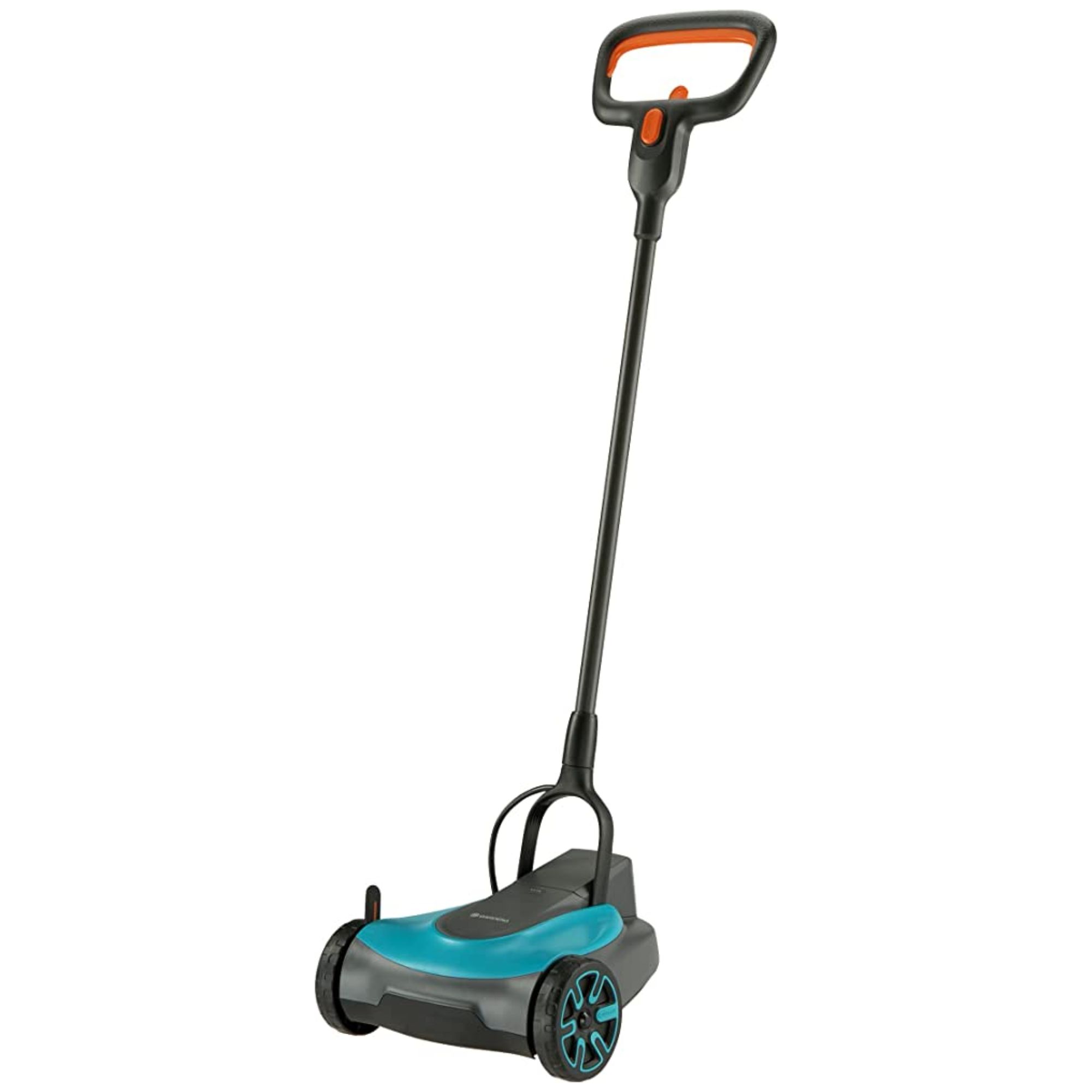
- Power type/source: Battery-powered (lithium-ion)
- Deck/cutting width: 22 cm
- Cutting height: 30 - 50mm (3 height settings)
- Dimensions (cm): 38D x 35W x 125H
- Coverage: 50 m² (538 square feet)
- Weight: 6.2kg
- Charge time: 60 minutes
- Battery life: Up to 60 minutes, depending on battery
Who is this lawn mower for?
If you've got a small lawn, the Gardena Handymower is for you. On its product page, Gardena says 'keeping your small garden tidy has never been easier,' and that's definitely true – my lawn measures 12.5 square metres, and the Handymower makes light work of cutting my grass every time.
Plus, it's a compact lawn mower, so it's ideal if you haven't got very much storage space – and if you want a mower with a similar function to a mulching plug, the Gardena Handymower has a mulching blade which finely chops up grass clippings and filters them back onto your lawn so you don't need to worry about emptying it every time.
Who tested this lawn mower?
Unboxing, setting up and first impressions
The Gardena Handymower comes in recyclable cardboard packaging with no plastic or polystyrene. It is well-packaged and secure, with more cardboard protecting the mower inside. The mower comes in two parts, easily assembled by simply screwing the handle into the base unit. It also comes with a multi-language instruction manual and a quick start guide, to which is attached the starter key for firing up your mower.
The first aspect of the Gardena Handymower is noticing how light it is. Compared to my bulky Bosch electric mower, this is a dream to lift out of the box. The second is how small it is. The base unit is very compact, measuring just 38cm by 35 cm, so you can see straight away that this is a mower designed for small lawns.
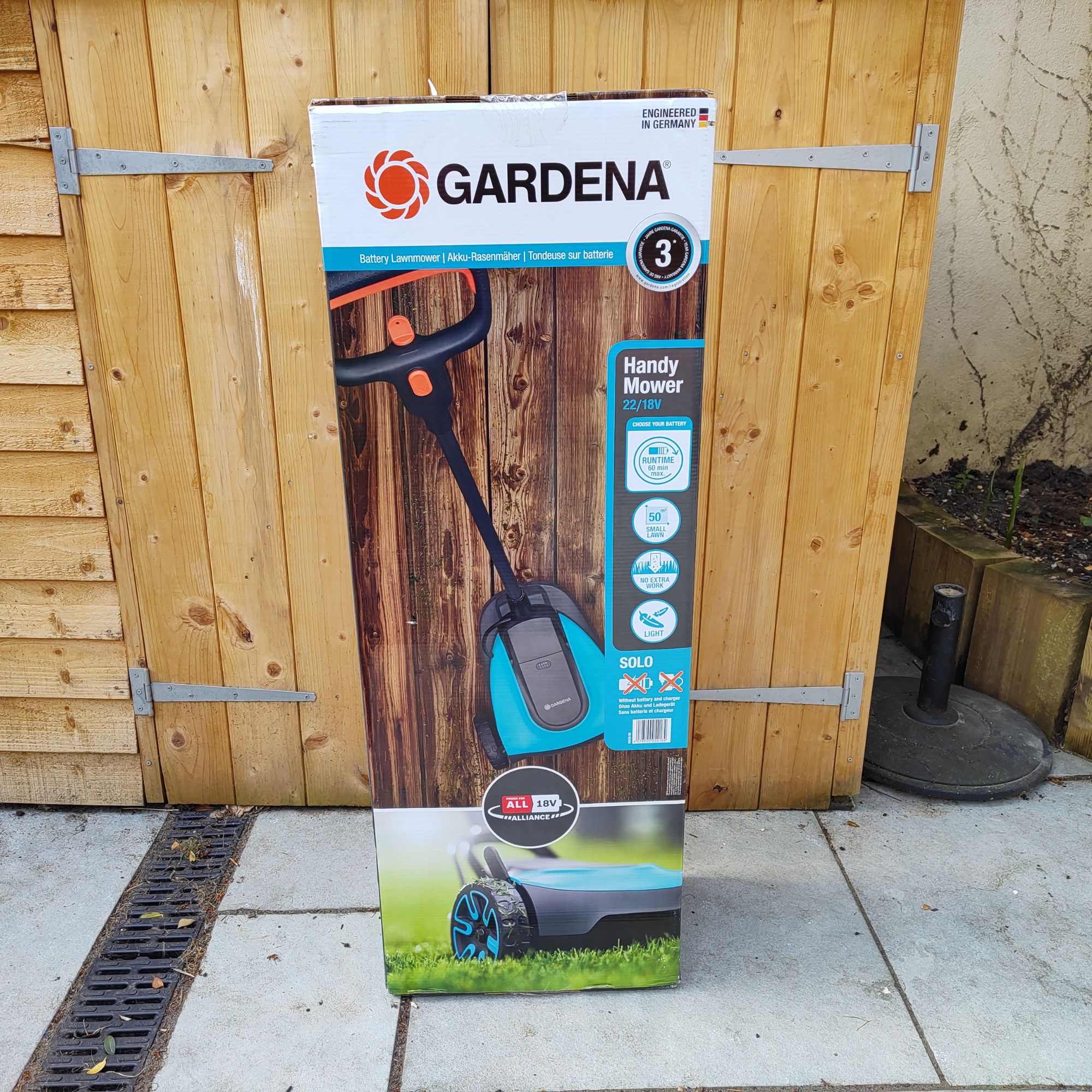
Turning the mower over, the 22cm stainless steel mulching blade is sharp and robust, while the pivoting back wheel promises manoeuvrability. On the top side of the mower is a lever for changing the cutting height to one of three positions, ranging from 30mm to 50mm.
The pivoting handle of the mower features a keyhole for unlocking/activating the mower, a push button to fire it up and a wide red ‘pull’ handle that you pull towards you to keep the mower operating. Releasing this handler will stop the motor from running. The handle itself is slightly bevelled, giving a secure grip.
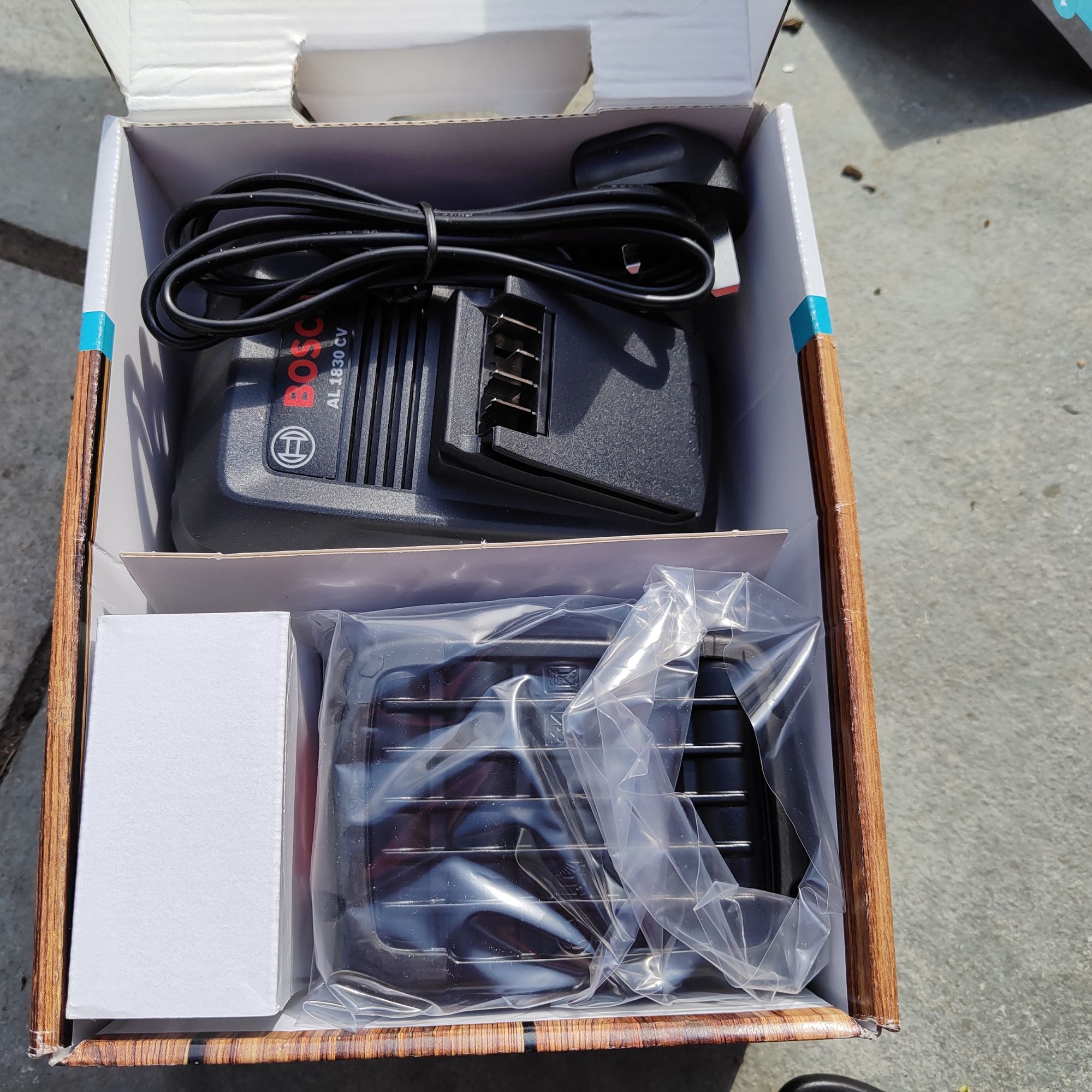
I was sent the Gardena Starter-Kit P4A PBA 18V/45 + AL 1830 alongside the mower. This is an 18V lithium-ion battery that powers the mower. As I’ve noted already – you’ll need to buy this separately. However, it is part of the Power For All Alliance, which means you can use this universal battery across various garden appliances and brands, including Bosch, Flymo and Gardena, which could save you money in the longer term.
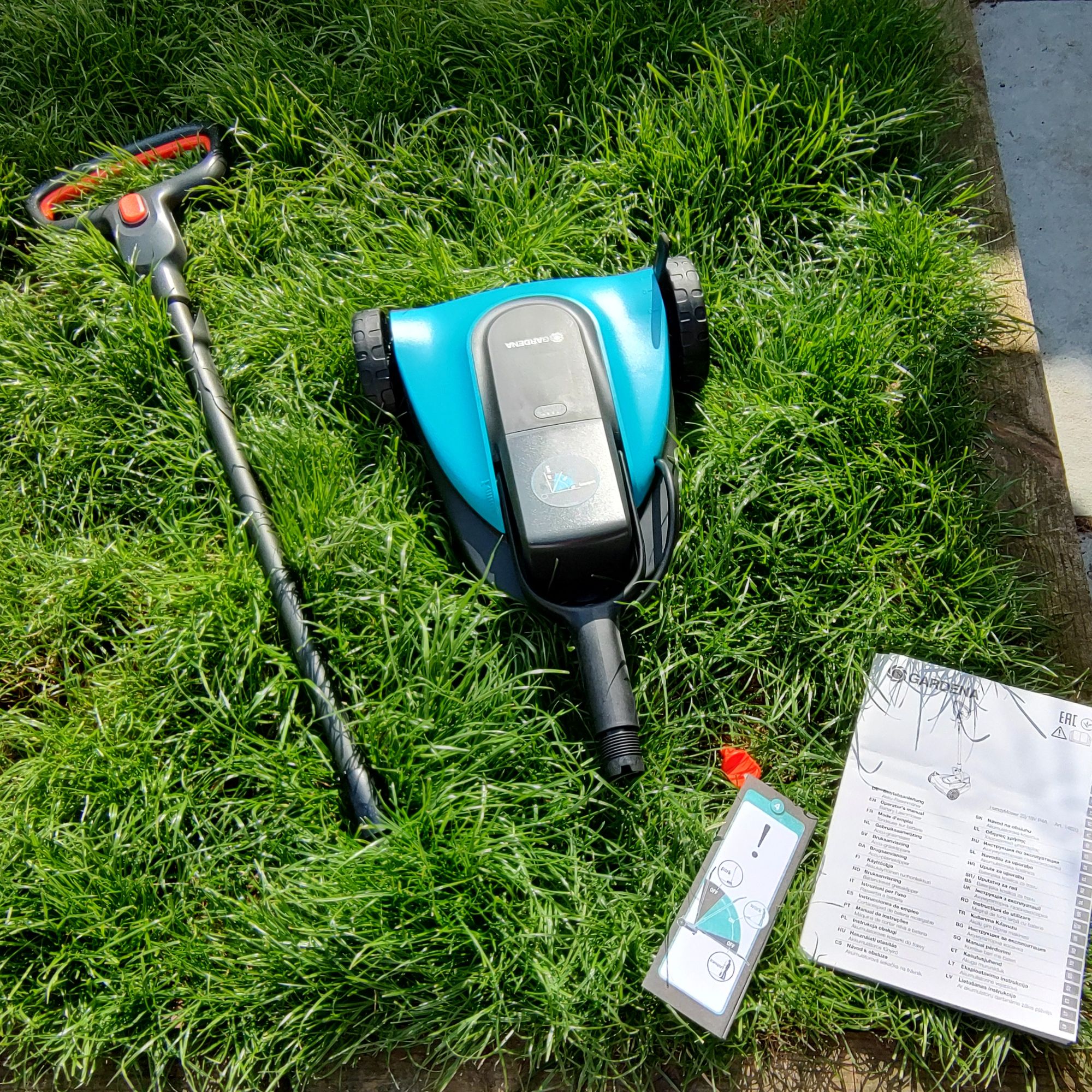
The battery is easy to set up – simply pop it into the charger and plug it in to charge. I found my battery had some charge on it, so I was ready to use it in 45 minutes. However, if you run it down, it takes 60 minutes to charge fully, although you can use it from 80% charge according to the instructions.
The Garden Handymower comes with a three-year warranty, but you do need to activate this within three months of purchase on the Gardena website.
What it's like to use
My first mow using the Gardena Handymower looked at how well it could cope with longer growth and slightly wet grass. Although there hadn’t been much rain in the last few days, the ground was still damp, and I was cutting my grass in the morning when grass tends to be wetter.
There are three cutting heights to choose from, ranging from 30mm to 50mm. Although I couldn't find any information in the manual about which cutting setting was the longest or shortest, it’s clear when you change the lever as the mower body moves up to accommodate a longer setting and down to produce a shorter cut.
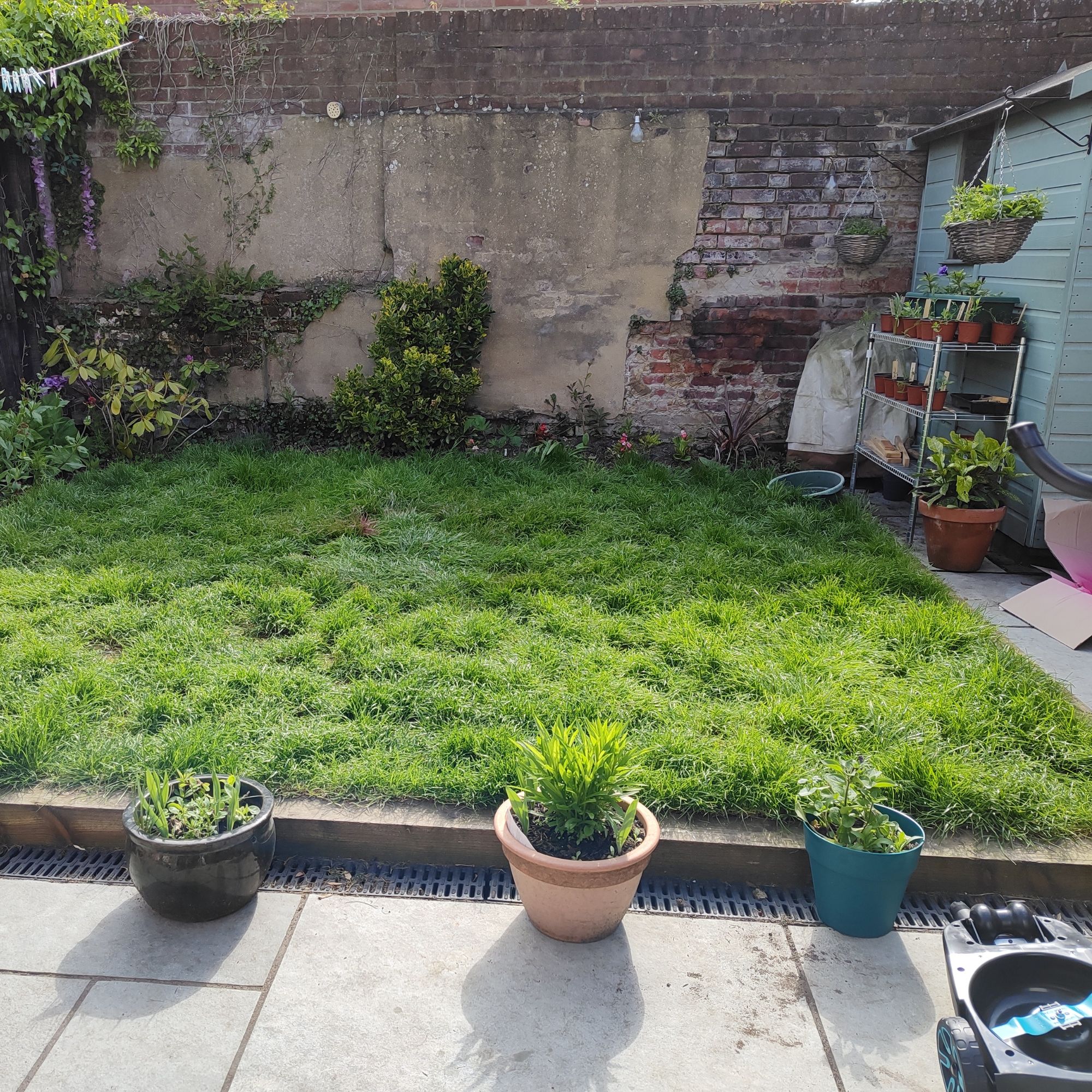
Opting for the shortest cut, I found that the mower coped well with longer grass growth, leaving a clean cut. The pivoting handle makes pushing with one or both hands surprisingly easy. In addition, because it’s small and agile, it can move smoothly along any border edges, removing the need to strim or clip after mowing, leaving a very neat finish.
The 22cm mulching blade is designed to clip grass and let it fall back into the lawn, providing a natural fertiliser. However, on wet grass, this feature didn't live up to expectations. All the clippings became lodged underneath the blade, stalling the motor several times during mowing. I had to manually remove the clippings from under the blade before I could get it started again.
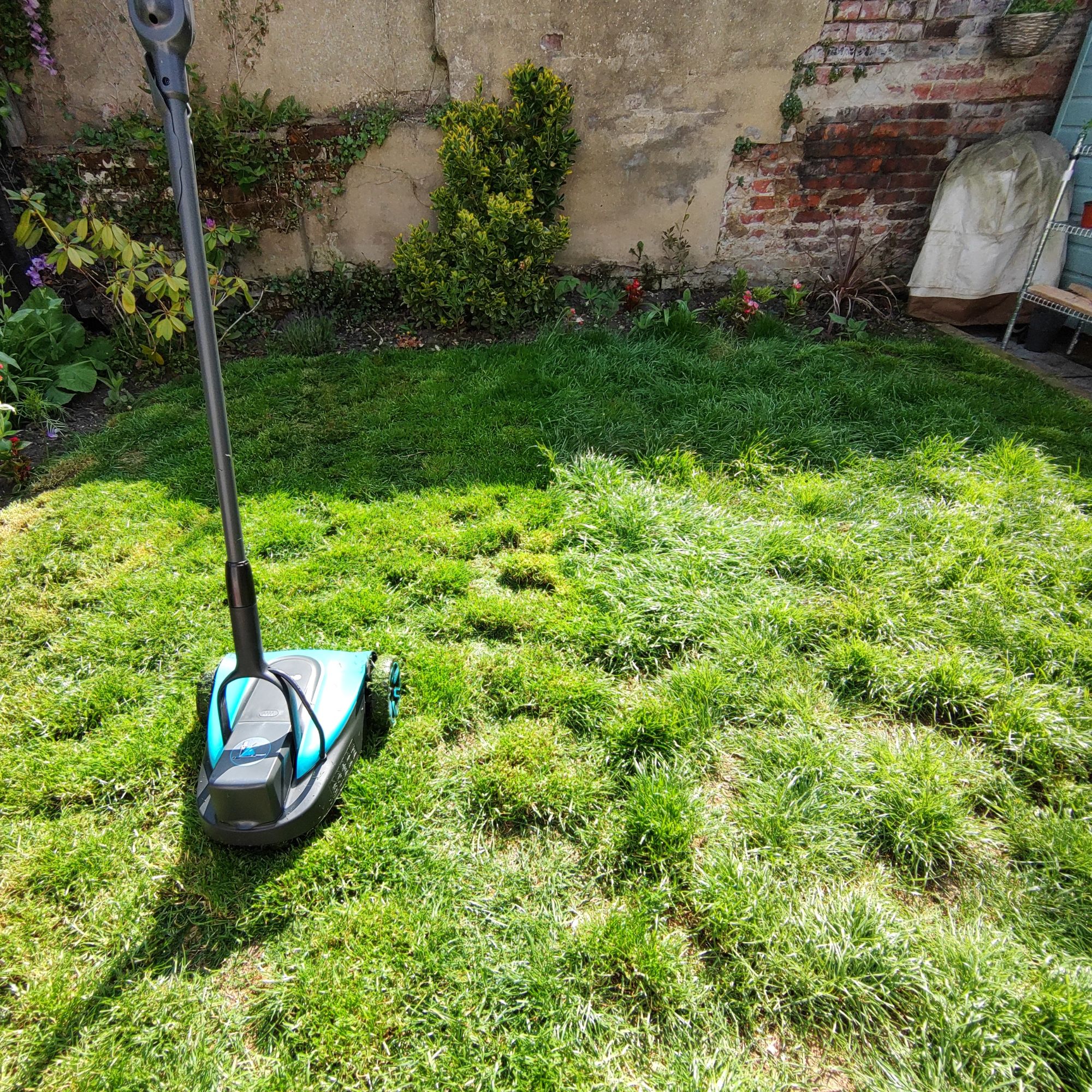
The handle is designed to have three positions: upright is park mode, and horizontal is carrying mode. Operation mode is between these two positions, so moving the handle into a horizontal position tends to cut the motor from running. You have to quickly learn which angle at which to push the mower along. This can be frustrating initially, but you soon get used to it.
The LED display on the mower allows you to see how much battery you have left. On my small lawn I only used around 20% of the battery in the 5 minutes or so it took to cut my lawn, so I’d estimate anyone with a lawn measuring up to 50 square metres shouldn’t have any problems in mowing their whole lawn before the battery runs down. Of course, runtime depends on which battery you choose to go with your Gardena Handymower – some come with around 20-25 minutes of runtime while others give you a whole hour of use.
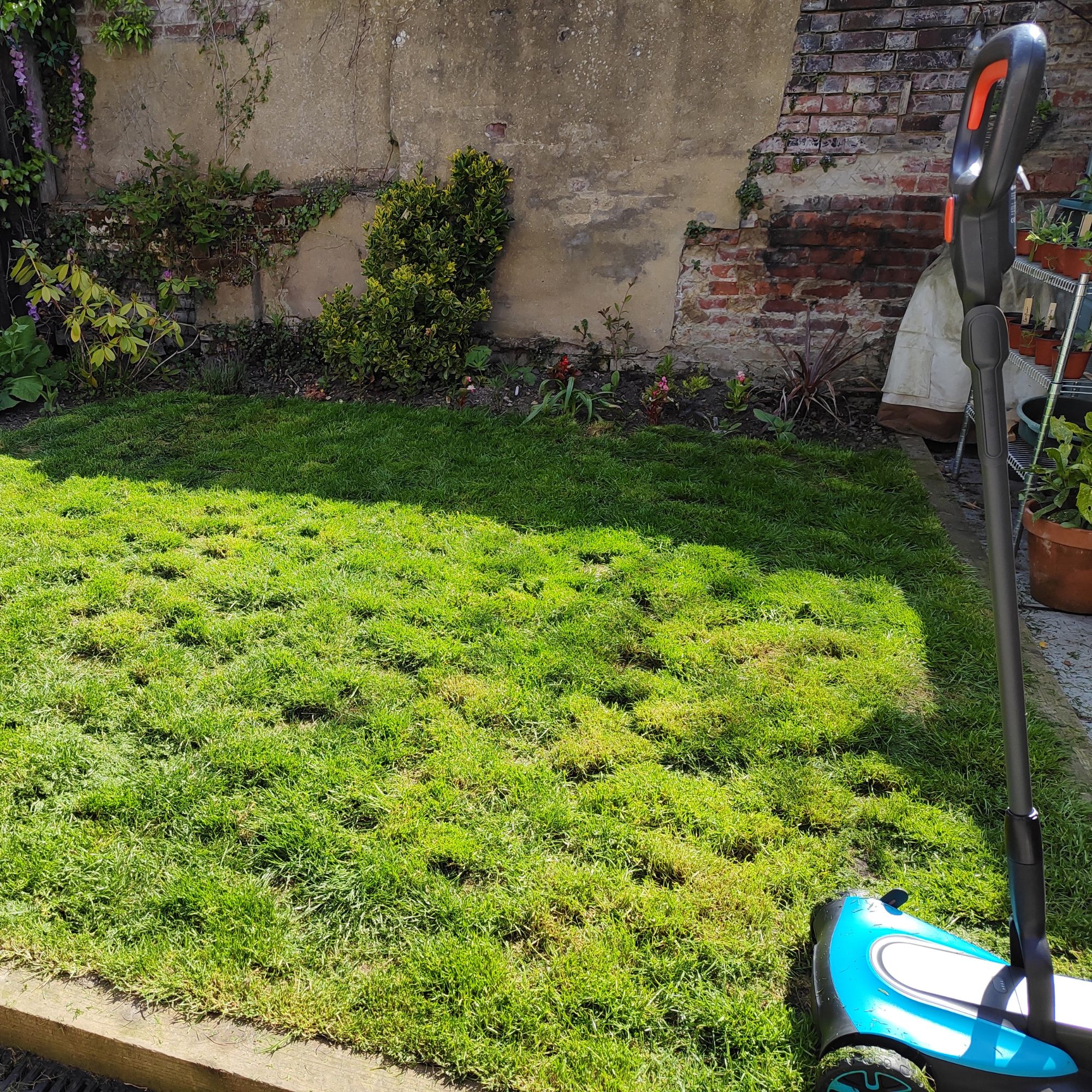
I cut the grass again a week later, this time on a dryer lawn. This time I found the clippings did fall to the lawn’s surface, and there was no need to clean out the mulching blade during the mow.
Cleaning
The simplicity of the Gardena Handymower with a single mulching blade underneath means it is very easy to clean. There’s no grass clipping bag or box to clean out, as all the clippings fall back onto the grass. If you do cut damp or wet grass, however, as I did during testing, be prepared to stop a few times during cutting to clean out the blade as wet grass tends to clump underneath it, stalling the mower.
You can use a putty knife or a brush to sweep out the clippings but be sure to turn off the mower completely before doing this to prevent any accidents.
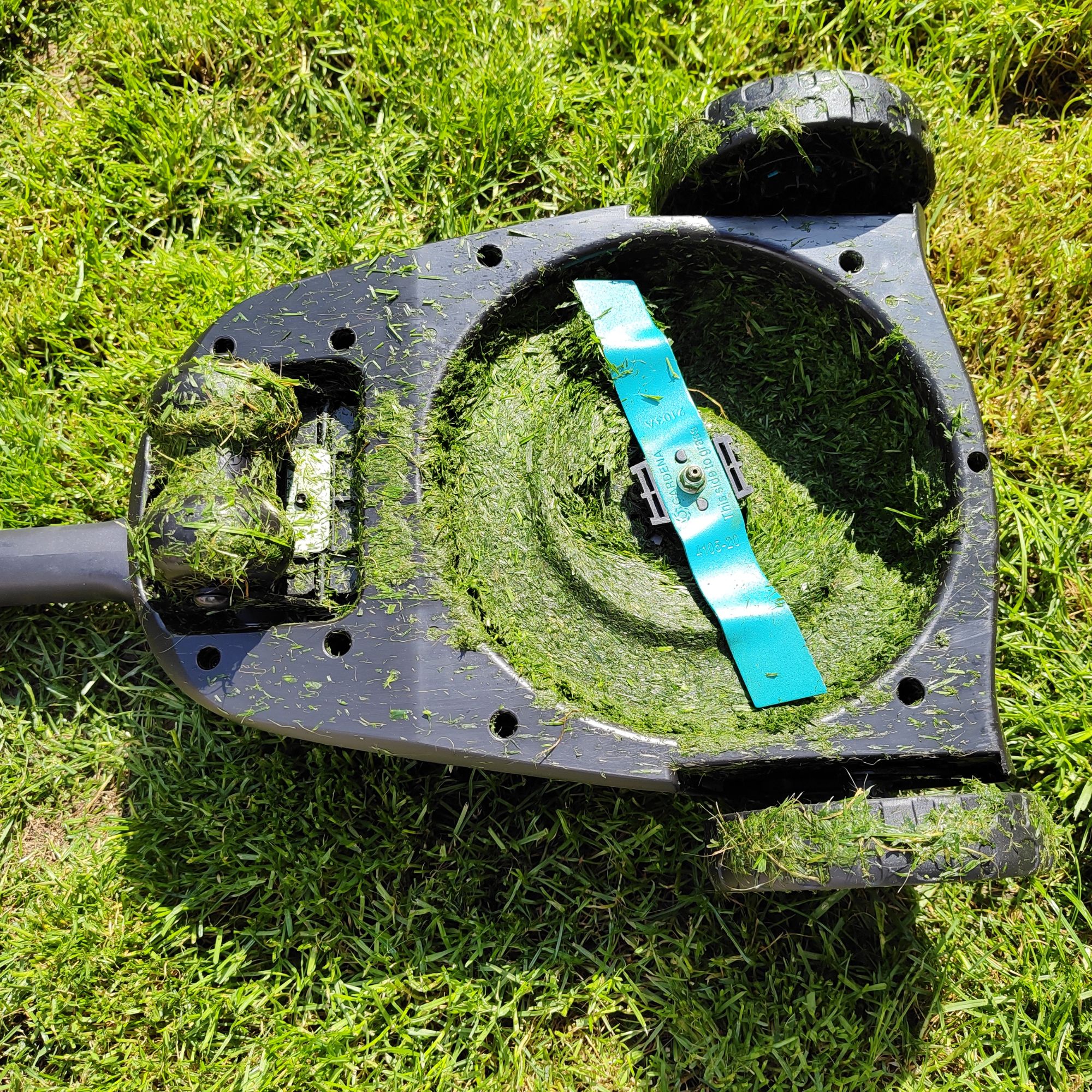
Storage and maintenance
The most remarkable feature of the Gardena Handymower is how small and compact it is. The base unit folds vertically to take up even less space as you can stand it up against the sides of your shed or outhouse. Unscrewing the handle from the base unit makes it even shorter so if you have a low storage unit you can be reassured it will fit.
The large handle and the lightweight design means the mower is easy to carry and you can hang it flat on a wall, saving even more space.
While battery-powered lawn mowers are generally easier to maintain than electric or petrol-powered lawn mowers, they still need regular maintenance and servicing. The manual with the mower details its servicing requirements. It also gives basic tips on maintaining the mower, such as cleaning the blade, storing the battery correctly and troubleshooting any common problems.
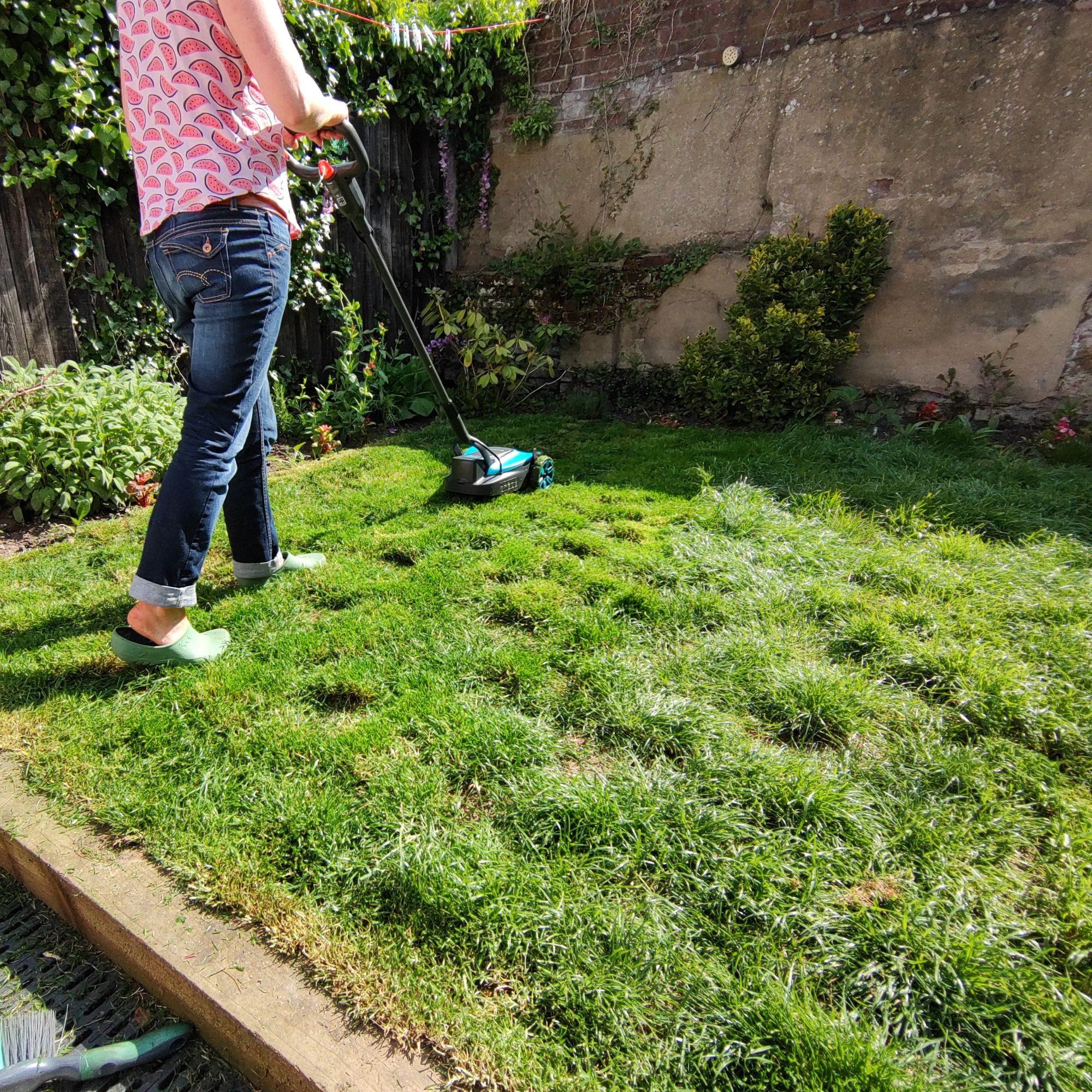
How does it compare to similar mowers?
The Gardena Handymower scores an impressive 4.1 stars out of 5 on Amazon, with more than three-quarters of happy customers giving it 4 or 5 stars. They enjoy how easy and lightweight the mower is during operation and how easy it is to store away when not in use. In addition, gardeners with back issues find it particularly easy to operate.
However, there is a certain level of disgruntlement with the fact that the mower comes without a battery, pushing the overall cost up. As a result, some customers say they’re not sure they’re getting great value for money.
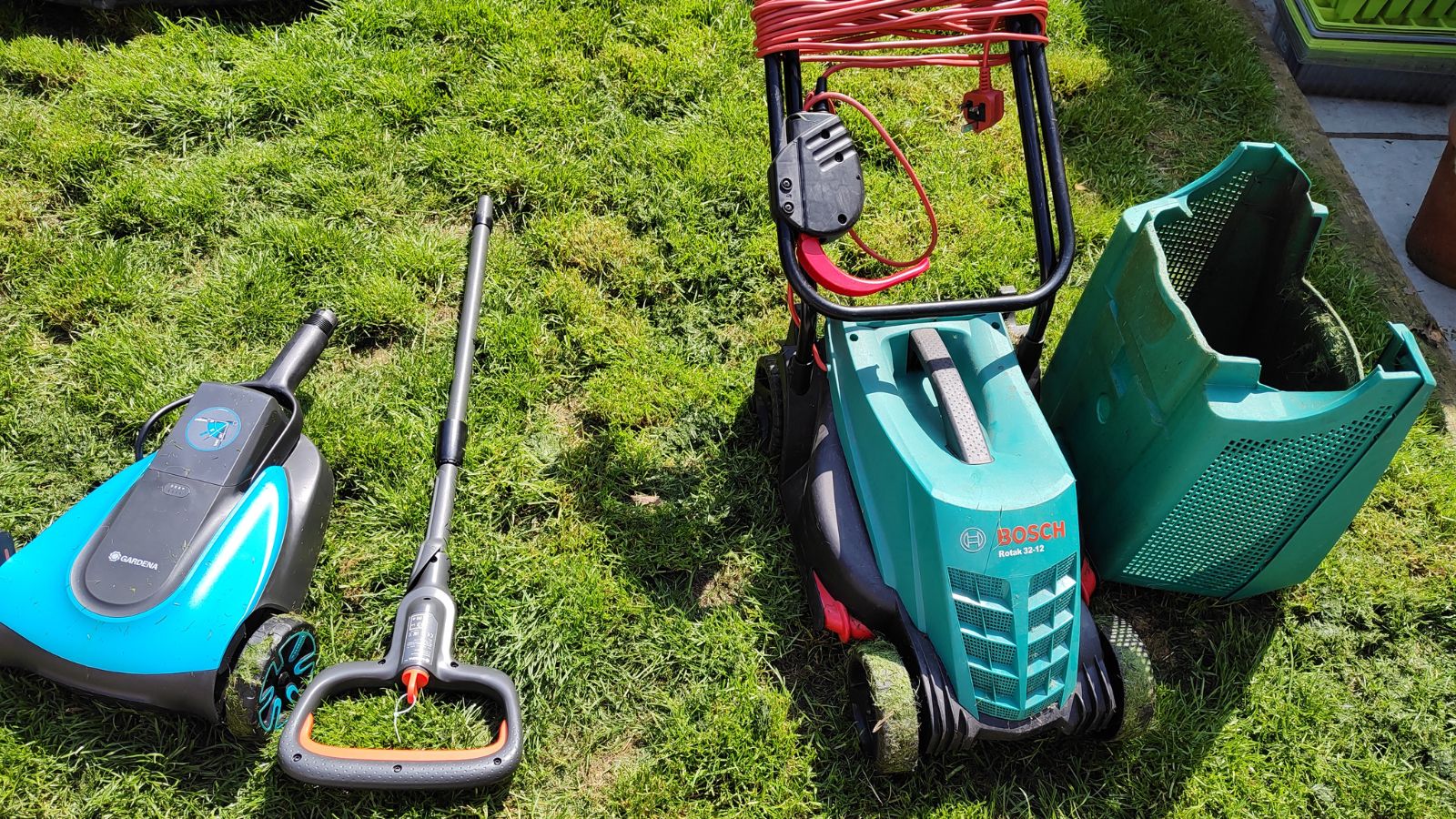
Compared with bigger and bulkier battery-powered lawnmowers from other brands, such as Kärcher, Bosch and Greenworks, the Gardena Handymower may seem flimsy in design. But during operation, despite its lightweight feel, I found it to be robust and sturdy. Considering that it is produced with small lawns in mind and that there’s no need to crack a nut with a sledgehammer, this mower does everything you need without taking up lots of space in your garden shed. Because there is no grass box to collect clippings, you can also be more agile with tight corners and spaces.
If you want to collect grass clippings instead of letting them fall back on the lawn, Gardena also produces a battery lawn mower with a 25-litre grass box, and there’s very little difference in cost between the two.
Also consider:
For a very similar price, Gtech's Small Cordless Lawn Mower SLM50 can cover up to 100m² – double the area of the Gardena Handymower – so it's perfect if you've got a slightly larger lawn. There are also two cutting heights to choose from.
This Ryobi ONE+ Cordless 3-in-1 Mower triples up as a mower, strimmer and edger, and at just 3.3kg, it's even lighter than the Gardena Handymower. It doesn't include the same mulching functionality, though.
This cordless mower is Amazon's Choice, and reviewers praise its simplicity, light weight and brilliant cutting ability. It includes a mulching blade like the Gardena Handymower, too, and an easy-to-adjust cutting height.
Should you buy the Gardena Handymower?
If you have a small lawn and limited outdoor storage space, the Gardena Handymower is a perfect alternative to a standard electric or petrol-powered lawn mower. Its compact size means its storage footprint is tiny, perfect if you struggle to store larger mowers or want to free up some space in your shed. It’s easy to operate and produces a great clean cut. So if you want a no-frills, no-fuss mower, this is ideal. In fact, I’ve decided to keep this mower for my lawn and given away my Bosch electric mower to get the most from my own shed’s storage space.
However, I doubt it’s robust enough to handle difficult or rough terrain, and it won’t last the distance on anything larger than 50 square metres (538 square feet). It’s generally cheaper than other cordless battery-powered lawn mowers which offer larger coverage but more expensive than most electric-powered lawn mowers that use a cord. And don’t forget, having to buy the battery and charger set separately pushes the price up, although you can use this battery on other garden tools.
About this review, and the reviewer
In line with our policy on how we test products we recommend at Ideal Home, Joanne tested the Gardena Handymower in her garden over a few weeks, assessing battery power and how well it coped with wet and dry grass and longer growth.
Joanne is a keen gardener and loves reviewing garden products designed for a small city garden with limited storage.







